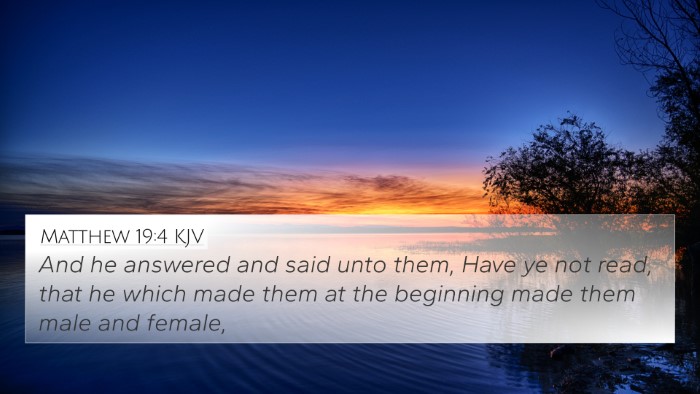Deuteronomy 24:5: "When a man hath taken a new wife, he shall not go out to war, neither shall he be charged with any business: but he shall be free at home one year, and shall cheer up his wife which he hath taken." This verse provides guidance about the responsibilities of a newly married man, emphasizing the importance of family time and stability in marriage.
Summary of Interpretation: Deuteronomy 24:5 offers insight into the sanctity of marriage and the responsibilities that accompany it. Only a year after getting married, a man is commanded to focus on his relationship with his wife and to support her emotionally. This suggests that God wants marriage to be a foundation of family life that needs undivided attention, especially at the start.
- Matthew Henry's Commentary:
Henry discusses how the laws regarding the newlywed reflect the understanding of marriage as a significant commitment, requiring not only legal recognition but also emotional investment and support. He emphasizes that this period of a year is crucial for the newly married couple to establish a strong bond together, free from the distractions of military duties or other obligations.
- Albert Barnes' Notes:
Barnes highlights how this statute speaks to the broader theme of compassion in the Law. It recognizes the unique needs of newlyweds, thus promoting the idea that marriage is a sacred institution deserving special care and consideration. The phrase "cheer up" indicates that the emotional health of the wife is paramount and that the husband has an important role in nurturing that relationship.
- Adam Clarke's Commentary:
Clarke elaborates on the social and cultural context of this law, explaining that it reflects the importance of family dynamics in ancient Israelite culture. The time prescribed here allows a husband to fulfill his familial duties without the overwhelming burdens placed upon him by society, such as warfare. The emotional and social stability it fosters is considered essential for the health of the community.
Bible Verse Cross-References:
- Genesis 2:24 - Explores the institution of marriage.
- 1 Corinthians 7:33 - Discusses the divided interests of married vs. unmarried individuals.
- Exodus 21:10 - Addresses the rights of a wife in marriage and the importance of caring for her.
- Proverbs 18:22 - Highlights the blessing of finding a good wife.
- Matthew 19:5-6 - Affirms the permanence and sacredness of marriage.
- Ephesians 5:25 - Commands husbands to love their wives as Christ loved the church.
- 1 Timothy 3:2 - Indicates that a church leader should be the husband of one wife, emphasizing marital faithfulness.
Thematic Connections:
Deuteronomy 24:5 not only serves as a specific guideline for newlyweds in Israelite society but also presents overarching themes related to:
- Marriage: Gifted as a relational and sacred institution.
- Family and Community: The well-being of the family directly influences societal stability.
- Emotional Care: Reflecting on the need for emotional support within marriage.
Cross-Referencing Biblical Texts:
When studying Deuteronomy 24:5, it's beneficial to explore interconnectedness across various scriptures. For instance, connecting the call for emotional nurturing in marriage within this verse to the exhortations found in Ephesians 5 provides a broader understanding of the biblical view on relationships. Similarly, comparing it with Proverbs and 1 Corinthians can yield insights into differing contexts but similar principles regarding marriage obligation and care.
Tools for Bible Cross-Referencing:
To deepen the study of Deuteronomy 24:5 and explore its connections, consider utilizing:
- Bible Concordance: To find words and themes related to marriage and family.
- Bible Cross-Referencing Guide: To engage with parallels across both Testaments.
- Cross-Reference Bible Study: To analyze and apply the relevant principles in a modern context.
Conclusion:
The insight offered from Deuteronomy 24:5 highlights the importance of marriage in God's design for family life. It underscores the necessity of a supportive partnership in the early stages of marriage, aiming for a strong foundation. By employing cross-referencing techniques and synthesizing comments from respected biblical scholars, readers can uncover deeper meanings within this verse and its application in both historical and contemporary contexts.












